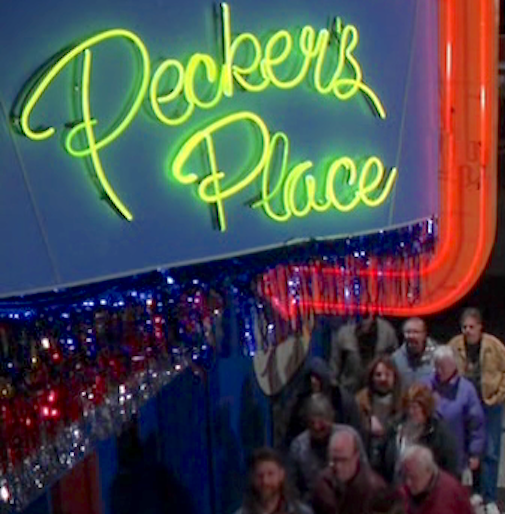Team Experience is celebrating John Waters for his 75th birthday. So here's a special episode of "The Furniture," by Daniel Walber, our series on Production Design.

Pecker is a rare, quiet(er) film in the John Waters filmography. It’s not as outrageous as Pink Flamingos or Female Trouble, nor as bombastic as Hairspray or Serial Mom. It’s plenty lewd, of course, and it’s hardly devoid of yelling. But it’s understated.
After all, it’s a movie about photography - pictures over words, that sorta thing. It’s about capturing the essence of Baltimore in crisp snapshots. The titular Pecker (Edward Furlong) is an amateur photographer with a passion for the little moments of his life: a burger on the grill, the Hampden neighborhood welcome sign, rats mating in an alley...
Pecker’s father (Mark Joy) runs a nearby bar, slinging two Baltimore classics: Natty Boh and steamed crabs.

The exteriors of these mom-and-pop shops really define Pecker’s aesthetic. The bar, for instance, is named “The Claw Machine.” its nearly windowless facade is red and blue, a couple of crabs painted onto the siding.

Across the street is a new strip club, which is already ruffling some local feathers. You can’t have alcohol and show pubic hair - Pecker’s father is outraged. The establishment has a bright pink awning and it’s called “The Pelt Room.” Because of course it is.
It also has a charming hand-painted sign on the frosted window, advertising the apparently illegal goings on within.
Shelley (Christina Ricci), Pecker’s girlfriend, runs a laundromat nearby. It sits at the end of a block of classic Baltimore rowhouses. Its colors are muted, if not exactly appealing - orange and green seems like a weird choice for a cleaning establishment, unless it’s meant to suggest the fluids that Shelley will get off your clothes.
Pecker’s mom (Mary Kay Place) brightens up the neighborhood with her little thrift shop, its light blue facade decorated with flowers.
Even Memama is contributing to the area's visual character, selling classic Baltimore pit beef sandwiches from a little stand in front of their bright yellow house.
All of this adds up to a Charm City that is full of charismatic details, many of them homemade. Pecker looks around Hampden and sees life worthy of his camera, and his eye for artistic value quickly skyrockets him to fame in New York. But, as it turns out, Manhattan doesn’t have much of its own local culture to speak of.
Waters introduces Pecker’s opening night with a montage of other gallery windows. They all look the same, minimalist and formal. They might as well be the logos of accounting firms.
The restaurant that hosts the after party at least has some neon, but it might as well be nameless. “B BAR GRILL CAFE,” it shouts into a downtown full of interchangeable bars, grills, and cafes.
It’s far cry from Baltimore, where there are random billboards advertising nothing but good vibes.
But the winning storefront of the whole movie, the pièce de résistance, is the gay bar where Pecker’s older sister (Martha Plimpton) works. It’s called the “Fudge Palace,” obviously, because this is a John Waters movie. It’s in a castle-themed building, like a Medieval Times with a different sort of jousting. All the dancers are trade, the sign on the heavy wooden door insists.
This is the joy Baltimore provides, a joy that is finally balled up into one establishment in the film’s triumphant conclusion. Pecker remakes his dad’s struggling crab shack into “Pecker’s Place,” a bar/grill/cafe/shrine/stripclub/crabshack. Here’s a joint where you can crack open a Natty Boh, visit with a talking Virgin Mary and get a lapdance from a local criminal - all at once, if that’s your thing. It’s a building that would merit landmark status, as far as I’m concerned.
Pink Flamingos (1972)
Female Trouble (1974)
Desperate Living (1977)
Polyester (1981)









